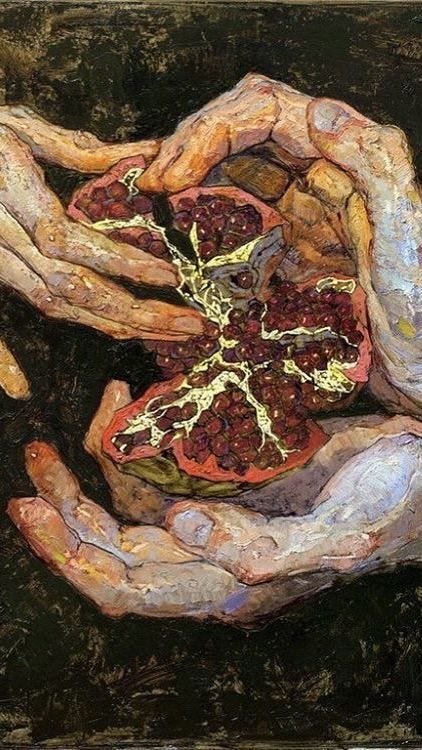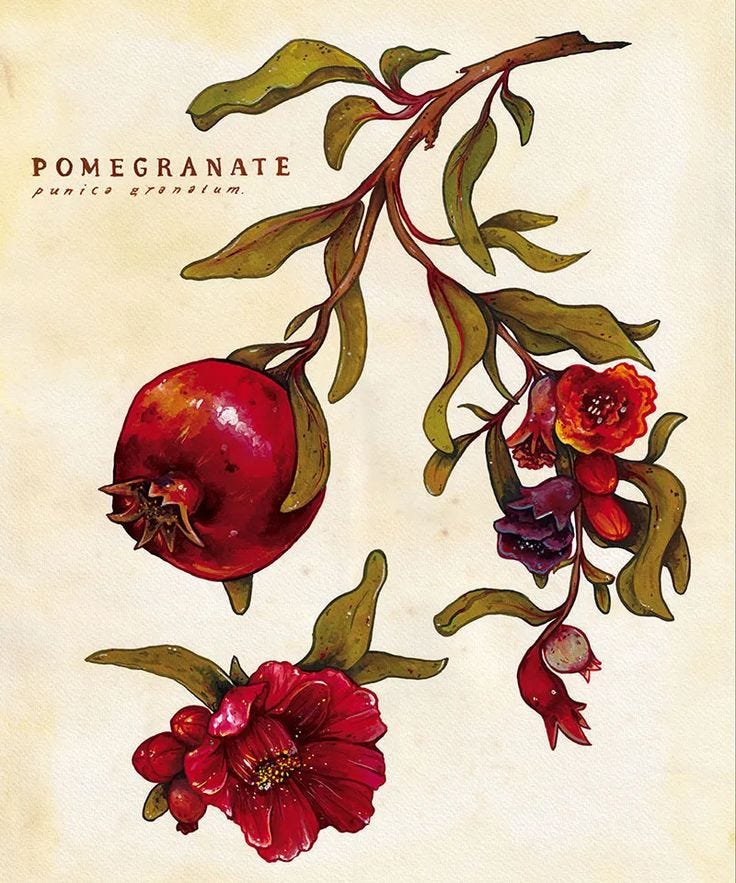The symbolism of the pomegranate
“The pomegranate stands, a symbol to comb, nature’s poetry, written in seeds. A timeless ode to life’s fertile creeds”
Persephone’s craving
The pomegranate holds significant symbolic and mythic importance in Greek culture and mythology. One of the most well-known associations is with the myth of Persephone, the daughter of Demeter (the goddess of agriculture and harvest). According to the myth, Persephone was abducted by Hades, the god of the underworld, and taken to the underworld against her will. While in the underworld, Persephone ate a few pomegranate seeds, which bound her to the realm of the dead. As a result, she had to spend a portion of each year in the underworld, and her time there coincided with the barren winter months. When Persephone returns to the world above, spring arrives, and nature blossoms again. This mythic connection has led to the pomegranate being seen as the symbol of life, death, and rebirth in Greek culture. It represents the cycle of the seasons and the interconnectedness of life and the afterlife. The pomegranate’s abundant seeds are often seen as a metaphor for fertility and the renewal of life. The tough outer shell of the pomegranate is sometimes seen as a symbol of perseverance and resilience. Despite its hard exterior, the fruit contains a wealth of seeds, reflecting the idea that strength and abundance come from facing challenges. In summary, pomegranates are deeply woven into Greek culture and mythology representing themes of life, death, renewal, fertility, and the enduring cycles of nature. They are not just fruits but carry profound symbolic significance in the cultural and religious narratives of ancient Greece.
The symbol with a modern twist
The pomegranate continues to be linked to fertility and motherhood in some cultures. In a holistic health approach, some even use it for hormone balancing in women. In other words, eat your fruit. It is also seen as a positive symbol for couples trying to conceive or for expectant mothers representing the potential for new life and abundance. The deep red color of pomegranate seeds is associated with passion and romance. In modern contexts, the fruit may be used as a symbol of love and affection, making it a meaningful gift in romantic relationships.
Christian symbolism
It’s important to note that while pomegranates have historical and cultural significance, the specific interpretations of their symbolism in Christianity may vary among different denominations and theological perspectives. The symbolic meaning often arises from cultural and contextual associations rather than direct biblical references. As with any symbolic interpretation, individual beliefs and cultural contexts play a significant role in understanding the symbolism of the pomegranate in a Christian context. The abundance of the seeds in pomegranate has been associated with the idea of resurrection and eternal life. The fruit’s bursting open to reveal numerous seeds can be seen as a symbol of life emerging from death, aligning with Christian beliefs in the resurrection of Jesus Christ. In some Christian traditions, the pomegranate is considered a symbol of righteousness and virtue. Its many seeds have been likened to the multitude of good deeds or commandments, and the fruit is sometimes associated with the pursuit of a righteous life. The pomegranate’s rich symbolism of fertility can be connected to the biblical theme of fruitfulness. In the Bible, bearing fruit is often used metaphorically to represent a productive and righteous life. The pomegranate’s fertility symbolism can be aligned with the Christian concept of bearing spiritual fruit. In the Old Testament, pomegranates are mentioned in the context of the design of the temple in Jerusalem and the garments of the priests. In the book of Exodus, pomegranates are described as decorations on the hem of the high priest’s robe, with bells placed between them (Exodus 28:33-34). Some interpret these details as symbolic of beauty, fertility, and the abundance of blessings.
In turn the pomegranate is the girly pop of fruits, shhhhh don’t tell the peaches they don’t have to know.
I would like to thank you for reading this blog post stay tuned for next Tuesday, with best regards,
The poet of the femme <3




